Baritone Roberto Scaltriti
A Conversation with Bruce Duffie
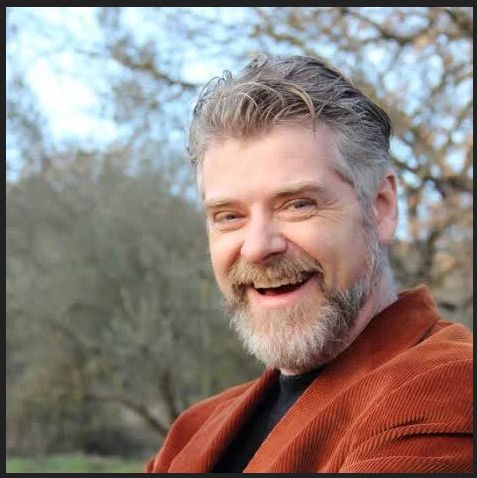
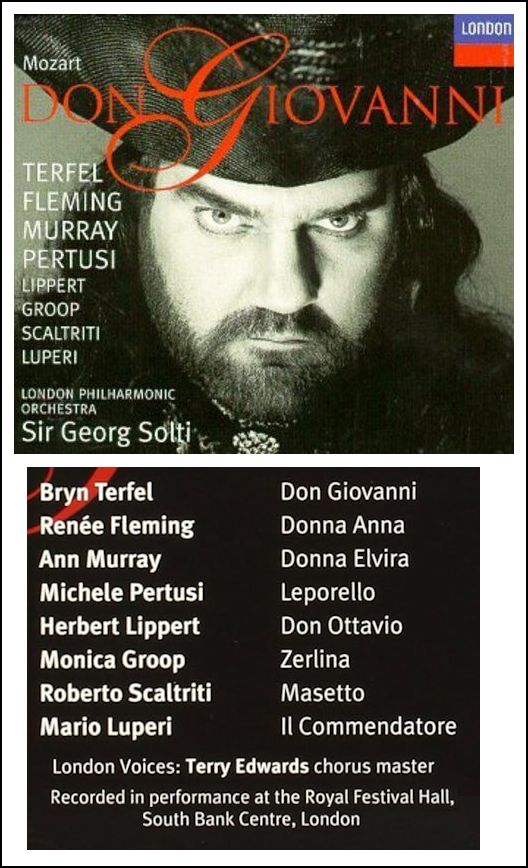
In the fall of 1995, baritone Roberto Scaltriti appeared with Lyric
Opera of Chicago as Masetto in Don Giovanni. The cast included
James Morris in the
title role, Bryn Terfel and later Alan Held as Leporello, Luba Orgonasova
as Donna Anna, Carol Vaness
and later Juliana Rambaldi as Donna Elvira, Frank Lopardo as Don Ottavio,
Susanne Mentzer and
later Andrea Rost as Zerlina, and Carsten Stabell as the Commendatore.
Yakov Kreizberg
conducted, and Matthew Lata directed the Jean-Pierre Ponnelle production.
[Vis-à-vis the recording shown at left, see my interviews
with Renée Fleming,
Ann Murray, and Sir Georg Solti.] [Names
which are links on this webpage refer to my interviews elsewhere on my website.]
Between the second and third (of twelve) performances, Scaltriti
was gracious enough to sit down with me for an interview. His
English was quite good, though at one point it did frustrate him a bit
not to be able to expound as he would have liked. However, his ideas
came across directly and understandably. Portions of the conversation
were aired on WNIB, Classical 97 to promote the later performances, and
again when his recordings were presented on the Sunday Evening Opera.
Now, thirty years later, I am pleased to present the entire encounter
on this webpage.
Since he was singing Mozart at that time, that is where we began
. . . . .
Bruce Duffie: Is there a secret to singing
Mozart?
Roberto Scaltriti: A secret? No...
he’s my favorite composer at the moment.
BD: Why?
Scaltriti: Because my voice suits it very
well. It’s what they told me, and what I feel personally,
and because it’s a good feeling I have for this sort of music. It’s
not just because of the singing, but also the theatrical part. The
Mozart operas are very interesting, and I really love to be in them.
BD: You’ve also sung some bel canto
operas?
Scaltriti: Some, yes.
BD: Is there a big difference between the
Mozart style and the Italian bel canto style?
Scaltriti: It depends. I don’t think
there should be such a big difference. It’s more about the attitude.
In the bel canto you have mainly the singer coming and singing,
and, of course, caring a lot about putting the inflections into the music.
Then there is the line and the beauty of the sound. In Mozart,
especially in the baritone and bass roles, you can be a little bit more
comfortable, because there are other things which are of more concern...
such as the stage. Sometimes the words are more important than
the melodies, but this is just from my point of view. If you speak
to the soprano when she’s singing Donna Anna, or a tenor who is singing
Ottavio, they would probably tell you there is no difference at all,
because they have incredible lines to sing.
BD: For you, does the balance between the
music and the words change from opera to opera?
Scaltriti: There are operas where I feel
the libretto is not as interesting as the words, and they are just written
for making sound. This is basically Rossini, for example.
In his operas, all the talking is done very quickly, and is basically
on the music. In Mozart we must be very comfortable and confident
about the meaning of the text, because it has a beautiful libretto which
is so full of double-meanings. So it depends really on what the
director wants, but you can make an interesting job of it.
BD: The double-meanings of the words would
be Da Ponte, but Mozart underlines them. Do you have to underline
them as well?
Scaltriti: Yes... well, this I don’t know.
It really depends on the conductor. It’s not often so much a
choice of the singer, but Da Ponte and Mozart worked so well together.
It seems to me that every time Da Ponte wants to put in double-meanings,
Mozart agrees in the music, and it’s very, very interesting. It’s
one of the better collaborations between the composer and the librettist.
BD: Here in Chicago you’re singing Masetto,
but you’ve also sung the title role of Don Giovanni.
Scaltriti: Yes.
BD: When you’re involved in a production
as Masetto, do you pay particular attention to the man singing Don Giovanni,
so that you can pick up tricks for when you sing that role?
Scaltriti: Of course I do, but it depends...
In some cases I have sung Masetto and understudied Giovanni,
so I did pay a lot of attention to it. This time I’m just enjoying
listening, but I’m more focused on Masetto, and really just taking care
of that.
BD: Can you really do a lot to bring Masetto
to life?
Scaltriti: It depends on whether the production
is open to new ideas, or if it is a revival, like in this case. As
much as possible, here in Chicago we have tended to redo it exactly
as it was. I had one experience in Glyndebourne where we created
every character. This was the production by Deborah Warner, and
it was a very modern production. It was really a change from any
vision of the opera, because we were wearing normal clothes, and had almost
no make-up. The set was also very modern.
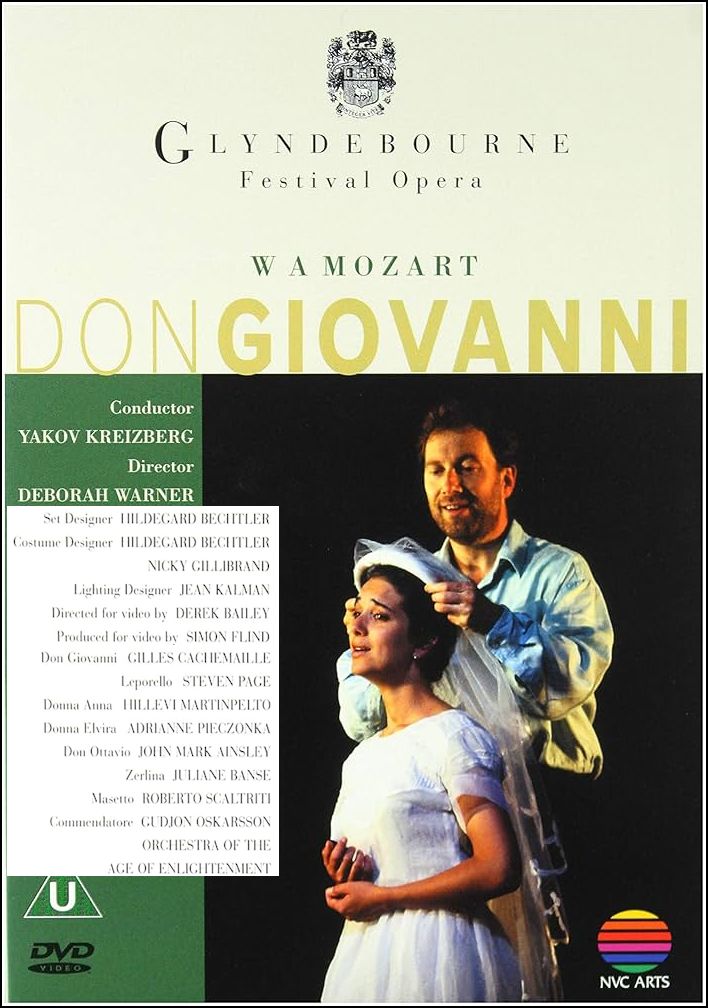
BD: The cast was in everyday street
clothes?
Scaltriti: Yes, and we were supposed
to play the action in 1994. So it was very different. But
what was good was that everybody was given the freedom just to create
one’s own role, and to allow one’s own personality a bit into the roles.
So Masetto was more of a very temperamental boy than a simple peasant,
as it should be played all the time. In a way it was interesting,
but it was very, very different from every other Masetto I could imagine
or have seen. Personally, I like it very much when Masetto is like
he is here, a young peasant who has a relationship with Zerlina. It
was pretty dramatic playing Masetto in 1994. It showed the problems
of the couple not really getting along very well! It was an actual
problem in fact!
BD: Can you bring some of the ideas from
1994 into the general character of Masetto, or in the general character
of Don Giovanni?
Scaltriti: That’s more difficult.
Maybe Don Giovanni... [Both laugh]
BD: Are there Don Giovannis living today?
Scaltriti: [Thinks a moment] Yes, a little
bit! Of course, the problem of playing Don Giovanni in 1994
is how can one really play the nobleman with everything concerning that
rank? He has power, and the fact is that everywhere he is arriving
he is welcome.
BD: [With a wink] Here in the United
States, the advertising says that if you have an American Express Gold
Card, you are welcomed everywhere! [Both laugh]
Scaltriti: Yes, but there is something else.
I’m reading at the moment The Memoirs of Casanova, which
adds a little bit of collaboration with Da Ponte and the libretto of
Don Giovanni. I find it extremely interesting, not for the
list of the women he actually had
— because it’s a never-ending
list! —
but it’s the costumes and the style of the time. Wherever
he was arriving he had a personal moment in his life. This is not
just because he was so rich. He was also very poor sometimes, but
the fact that he was a noble in his attitude. That makes somebody
welcome everywhere. I don’t really think we can imagine something
like that today, even for a person with money. It’s something
very special.
BD: It really is the attitude?
Scaltriti: Yes, yes.
BD: Aren’t there people today who have that
bearing, and that attitude?
Scaltriti: There are, but the society has changed.
That’s what I mean. What I am talking about is when Casanova
was arriving in a hotel, for example, in this hotel there were other
families who were probably socially less powerful. They really tended
to try to have his attention, and felt it necessary just to spend some
time with him.
BD: Were they intimidated by him?
Scaltriti: Probably, as well, but they were
more fascinated than intimidated by him.
BD: I wonder if there’s a parallel, perhaps,
between that scenario and the great big movie stars today, or maybe The
Three Tenors. Would they get that kind of attention?
Scaltriti: It’s different because they are
really popular. That is really something which is fascinating to
the people. In the case of Casanova, it’s difficult to explain...
[Here he briefly laments not being able to fully convey his thoughts
in English.]
* * *
* *
BD: When you’re portraying these characters
on the stage, is it more difficult for you because you’re playing to
an audience of 1995, as opposed to the audience of 1789?
Scaltriti: [Laughs] That’s a good question!
I’m just trying to make a parallel between the two
things. Of course I’m fascinated about that period, and all of what
I have seen and read about it. The film Amadeus by Miloš
Forman, for example, was something sensational, and that I really enjoyed.
Other films of that century, such as Dangerous Liaisons, or the
same story also by Miloš Forman, Valmont, were really giving me
an idea of what could be. On stage we play something about the style,
and about our ideas, and what we all know. But it’s also supposed
to be appreciated by the audience. So, I’m not really sure what
I’m really doing in this case! [Laughs]
BD: You’ve played these roles in Glyndebourne,
which is a very small theater, and now you’re playing one here in Chicago,
which is a very large theater. Do you change your vocal technique
at all for the size of the house?
Scaltriti: I must admit, not really.
My surprise, and actually my pleasure, was to go first when I arrived
to listen to Don Pasquale in the auditorium. The acoustic
was great, really beautiful, and I didn’t have any trouble hearing any
of the singers [Paul Plishka,
Ruth Ann Swensen, Bruce
Ford, and Timothy Nolen,
conducted by Paolo Olmi.
Paolo Montarsolo
(himself a famous Pasquale in years past) directed the John Conklin production.].
I thought that the beauty of the sound was really extremely good, even
better than in a small theater where I’ve been singing. So I
was not intimidated when I started to sing. Also, because everybody
who was in the auditorium
— the coach, and the other musicians who
are collaborating with us
— were giving us adjustments about the
balance. Of course, if they say that it sounds all right, we do not
need to push. Pushing is not a good thing, and it doesn’t mean you
can be heard any more than without pushing. It’s just psychological.
If the sound is enough, it’s enough, and there’s
not much you can do about it.
BD: You know that your sound will fill the whole
house?
Scaltriti: I don’t have this feeling
myself on stage. I’m not really feeling it, but there is no
advantage in trying to push in order to feel things are then going
to be better. Most of the time if you push the sound, then it’s
not so good. You rely on what they tell you! [Both laugh]
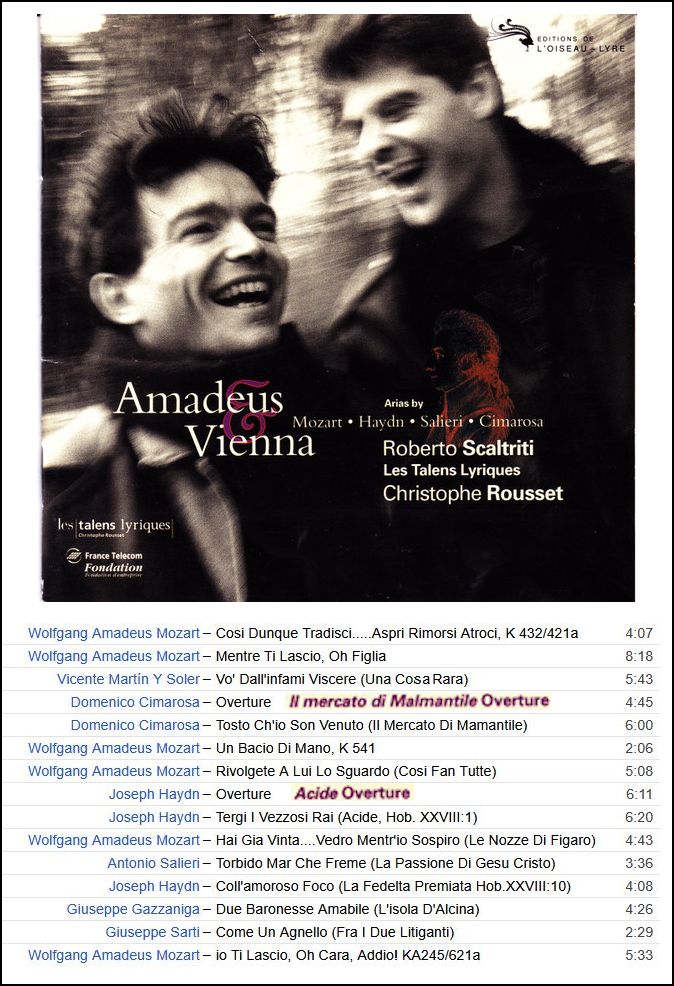
BD: You go with what they tell you,
and that feels good for the voice?
Scaltriti: Yes.
BD: You’ve made a couple of recordings.
Do you change your technique at all for the microphone?
Scaltriti: In depends on what I hear when
I go to listen to the master recording. If I feel that there
is something I can improve, of course I change it, but not really so
much. I must admit the pre-action of the voice for a recording
and for a theater is different. There is something that they
know very well when they are making a recording, and that is the distance
that every singer should have from the microphone. Some singers
are closer, and some singers are further away, and that’s already a
good way for setting up everything.
BD: Where do you stand? Are you closer
to the microphone or further away?
Scaltriti: I am pretty far away from the
microphones.
BD: That’s a good indication of what they
expect!
Scaltriti: [Smiles] Well, it depends!
I really don’t know. It’s just that probably my voice focuses
better a little further away, but it doesn’t really mean necessarily
that it is a good sign.
BD: Are you pleased with the records that
have come out so far?
Scaltriti: Up until now they are tiny roles
because I have had little experience with Verdi’s operas. The recordings
include Rigoletto [Marullo, with Nucci, Pavarotti, Anderson, Ghiaurov, Verrett, De Palma; Chailly], Il Trovatore
[An Old Gypsy, with Pavarotti, Banaudi, Nucci, Verrett, De Palma; Mehta], Un Ballo in
Maschera [Silvano, with Crider, Leech, Chernov, Bayo, Zaremba,
Howell; Rizzi] and Traviata
[Baron Duphol, with Te Kanawa,
Kraus, Hvorostovsky, Borodina;
Mehta]. However, we recorded a Handel opera in the summer, but
it’s not out yet. [Photo is shown below-left] I’m
very curious to listen to it.
BD: Is that a bigger part?
Scaltriti: Yes, that one’s pretty big.
It’s the role of Isacio [the Governor of Cyprus] in Handel’s Riccardo
Primo [Richard I, King of England]. We recorded it in Fontevraud
Abbey in France, which is the place where Richard the Lionheart is
buried. We did this opera in concert there, and then we recorded
it. The music is beautiful, with the chorus and an orchestra of
original instruments, so that the pitch was A=415, not 440, which is as
it should be for Baroque works. Personally, I was very pleased.
It is really beautiful music.
BD: We have talked quite a bit about Mozart.
Is there a difference between singing Mozart and singing Handel?
Scaltriti: I’m not an expert. I’m not somebody
who really knows about style, but my future wife is a musician, teaching
at the Conservatoire de Paris, and she is really into Baroque music.
So she told me about it, and we worked a lot on the cadenzas and
appoggiaturas, and all of what you need to make that music into
a good style. If you play bel canto, you are not really used
to making this sort of ornamentation, which is not so much in Handel.
Earlier music is much more complicated, such as the French Baroque music.
It’s really an enormous task. I found it very comfortable singing
Handel. It is extremely vocal, and very well written, especially for
my sort of voice. I must be careful not to allow my vibrato to be
too much, because the size of the orchestra is not so big, and it can sound
a little bit weird if you sing it like it could be Verdi. [Both laugh]
BD: If you put a Baroque orchestra under
Verdi, you’d completely swamp it!
Scaltriti: Yes! [More laughter]
BD: I understand you have a Mozart concert aria
recital. Has it been recorded yet? [This recording is shown
above-left]
Scaltriti: No, that has not yet been done.
It’s an idea coming from Christophe Rousset, who was the conductor
in this Riccardo Primo that we did in France. The idea at
the beginning was to sing the Mozart concert arias for bass-baritone.
Then we realized there are not so many, and so we thought about
putting together other composers who were active in Vienna at the time
when Mozart and Da Ponte were working together. We thought about
Giuseppe Gazzaniga, or Vicente Martín y Soler, or Antonio Salieri,
and a little bit of Haydn. What was very interesting for us at
the beginning were the two other operas which are quoted in Don Giovanni,
namely Una Cosa Rara by Soler, and I Due Litiganti by Sarti.
Bits of these are played in the supper scene [along with a bit of Mozart’s
own Marriage of Figaro]. Una Cosa Rara is the finale
of Act 1, so it’s an ensemble, and can be sung as an aria, but the bit
of I Due Litiganti is an aria written for a buffo. It’s
in a key for an old tenor, but we have found the manuscript in Paris
which has the bass line down one tone lower. So this could mean that
the buffo aria was sometimes sung by a baritone, or sometimes by a tenor.
Of course, we are not sure about it, but in my case [laughs] we sing it
in the baritone key.
BD: At least the fact that you’re not sure
means there could be some flexibility.
Scaltriti: Yes!
BD: There’s always the little bit of rewriting
and retouching in the early operas.
Scaltriti: Yes, absolutely.
BD: Do you think there should be rewriting
and retouching for the newer operas, too?
Scaltriti: I don’t know about this. Of
course, the manuscripts of operas which are nearer to our time are something
that we are more sure about. The autographs are not manuscripts,
as, for example, The Coronation of Poppea, where you have bits
written for Venice, and bits for Naples, and sometimes an aria is not written
in the one or the other, so now they just fill it up as best as possible.
But about Falstaff, there is not so much to be worried about, I
suppose! [Both laugh]
* * *
* *
BD: Are you a bass, or a baritone, or a bass-baritone?
What is your category?
Scaltriti: I started as a bass, but I started very,
very young. I was only seventeen years old at the time of my first
work. It was in Philadelphia, with the Philadelphia opera company,
which was part of their annual International Voice Competition. Since
then I have continued. I had just started my studies at the conservatory,
and I did my training in the conservatory at the same time I was singing
small roles around Italy and in Europe from time to time. My voice
is developing more and more as a baritone than as a bass, but for the
moment I’m sitting on repertoire which is recognized as being sung by both.
In a few years’ time I will see if I will be interested in the bel
canto more than what I am doing at the moment, and really then I
will try to choose which voice is mine.
BD: You’ll probably be a Zwischenfach
[between two categories; one who chooses from both lists] for your
whole career!
Scaltriti: [Smiles] I don’t know...
It could be nice, but it could be very dangerous, so I try to be very
careful.
BD: When you’re offered a role, how do you
decide yes or no?
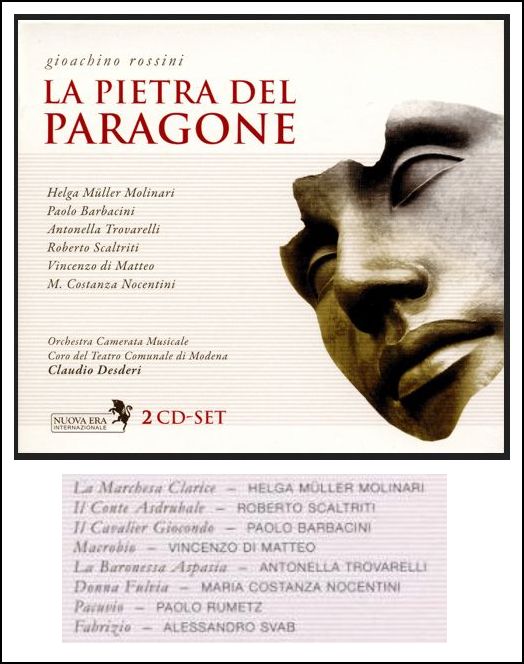
Scaltriti: It depends on the way it is written.
First of all, if it is very dramatic, I tend to say no right from the
start. It depends on the volume of the orchestra, which is accompanying
the bits you are singing, and then also on the style. For example,
Handel can be very, very high, especially at the A=440 pitch. But
as you really play it with a lot of coloratura, you can touch very high notes
with a very specific technique which is not damaging to the voice at all.
But if we’re talking about Puccini, or even more dramatic repertoire,
you need to go up to those notes with a completely other technique. That’s
especially true for a young singer, and it’s very, very dangerous... at least
it is for me. [Both laugh]
BD: So you have to be very careful?
Scaltriti: Yes, sure. I’m not even
thinking about it at the moment.
BD: Are you pacing yourself with the number
of performances you give each year?
Scaltriti: No, I don’t really think about the number
of performances. I’ve never counted how many I’m doing in a
year, but generally I’m taking opera productions with long rehearsals
periods. This means I’m not doing more than sixty or seventy
performances in a year.
BD: That gives you enough so that you
have a good income, and yet you get enough rest to keep the voice in shape.
Scaltriti: Yes, yes. Also, it’s good
when I have some time off for learning new roles. I’m still studying
with Claudio Desderi
from time to time, so I go practicing with him. [Note that Desderi
is the conductor of the opera shown at right!] Another person
I really care about is Julia Hamary, who is teaching me in Stuttgart. She’s
a wonderful teacher as well. I’ve done a few masterclasses with
her. She is a really fantastic person.
BD: I assume you’re booked a couple of years
ahead?
Scaltriti: Yes.
BD: Do you like the security of knowing
that on a certain specific day a couple of years from now, you’re
going to be singing a certain role in a certain place?
Scaltriti: Yes, absolutely. That’s something
which is making life easier in a way, and it’s also nice to know that
you are booked for the good repertoire. I like to experiment with
new things, and to try out new roles, but not so much. In case
they are really difficult, I plan to have some time off before to really
practice them.
BD: You’re singing a couple of new roles
each year, but is it nice to come back to the old familiar roles?
Scaltriti: Sometimes. For example, I must
admit this year in the summer I was Masetto, and I was understudying Giovanni,
but it never happened. Before, I was understudying Giovanni in
1991 and 1994, and I just did the cover show and all the rehearsals,
but I never had the chance to go on for the regular performances.
This year instead, I went on for the dress rehearsal, and for the second
performance. I hadn’t sung Giovanni since 1990, and it was really,
really nice to refine it. Everything was like I had just left it
one month before. It was not a shock, so in a way it was easier than
other experiences with different music. It was very nice.
BD: Do you do any new operas, twentieth
century pieces, or contemporary works?
Scaltriti: I did a Menotti work, The
Telephone in Naples. This was June of 1995, but contemporary
music, no. I must admit I don’t do any at the moment. I have
not been offered any. I have absolutely nothing against it. It
could be interesting in the future, but at the moment I don’t sing any.
BD: You’ve also done Il maestro di cappella
by Cimarosa. How do you like being the whole show?
Scaltriti: That was very interesting. In
the beginning I was very surprised at this offer from the theater of
Florence. I was not going to accept it, because I felt that generally
it’s played by a very experienced singer. For example, Claudio Desderi
is a wonderful maestro di cappella, but he has many years of experience on
stage. But they insisted, and the idea was to have really a young
maestro di cappella, and to change completely the atmosphere on stage.
So I accepted with pleasure, and it was really great in the end.
We had a nice relationship with all the instrumentalists on stage, and
the idea of the producer was to make it like a proper orchestra feeling
as the atmosphere. The production was by Fabio Sparvoli, and we
really enjoyed the time doing it. It was weird, especially in the
beginning. We had about ten days without the orchestra, so I was completely
alone on the stage, pretending to speak with violins and double basses.
Once the orchestra was there, it was much easier and we could create
a feeling.
BD: Is that something you would look forward to
doing again?
Scaltriti: This production could be nice.
I don’t think really I could do it in another situation. I’ve seen
Claudio Desderi performing it in a production by Roberto De Simone.
That was really in the period, with wigs and costumes of the eighteenth
century. It was beautiful, but I rarely think you need to have
as young a singer as me.
BD: Come back to it in thirty years!
Scaltriti: A good idea, yes! [Much
laughter]
BD: Are you looking to have a long career?
Scaltriti: I’m actually looking to enjoy whatever
I am singing. I’m not really dreaming about big careers, or success,
or being booked the whole time. I really like to enjoy the operas
that I am already doing that now, and possibly changing the subjects
from time to time. I really like to go from one production to another,
where you change completely the way of playing a character. At the
same time, it is really fascinating for me to try to play as much as possible
as an actor. I’m not an actor. I did not do any schooling on
that, and when you find a good producer it’s a challenge. We can
really try to correct our movements. It’s a really good part of this
job, and I like it. What I hope is to go further, to improve more
and more my stage work, and also to try different styles. For example,
Don Giovanni in Glyndebourne was with an orchestra and original instruments,
so it was at a different pitch. It was a different style, and we
worked pretty hard the first year with Simon Rattle creating a style for
this opera. It was very different from singing with the orchestra
here, which is a larger symphony orchestra, of course. It gives
another idea, and you sing in another way. There are slight differences,
but they are not so big.
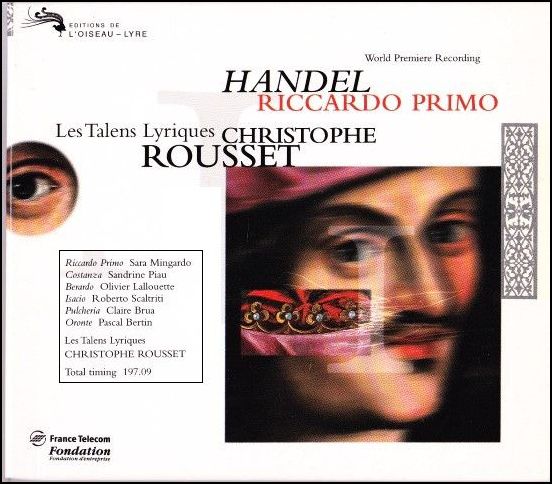
BD: How is it different?
Scaltriti: It is in the way you sing, and the way
you receive the sound of the orchestra, and the way you use your voice.
BD: It seems like a lot of it is a psychological
difference.
Scaltriti: Yes, of course.
* * *
* *
BD: Do you have any advice for younger singers coming
along?
Scaltriti: I have met many young singers recently,
and thought that many of them were really wonderful. Regarding the
Italians, many of them are already pretty famous. For example,
I started with Cecilia Bartoli when we were in Rome, but it’s not even
the case to speak about this great mezzo. She’s deserved a great
career, and I’m really happy for her. In Glyndebourne I had the
pleasure to work with Juliane Banse, who was Zerlina with me. She is
a very nice soprano, and in addition to the Mozart repertoire, I have
heard a wonderful record she has done with her teacher, Brigitte Fassbaender,
of duets by Brahms. She will have a very interesting career.
It’s a very beautiful voice.
BD: [At this point we stopped for a moment,
and he recorded a station break. I then asked his birthdate, which
he told me was April 6, 1969, so he was 26.] Are you at the point
in your career that you want to be at this still young age?
Scaltriti: I think so, definitely. What I
wanted at the beginning was not to burn the time very, very quickly.
Since the beginning, I was offered more important things than I have done
in some cases. I can very easily say no to many offers, and especially
today, having started with part of the Baroque repertoire, especially
Handel, but also Bach, I hope to sing more of those in my future.
I feel I can comfortably continue in this way for about ten years, and then
watch later to see what is going on. This is really a nice kind
of training I find for myself, to improve not just vocally but also psychologically
speaking. After all, it’s a job you enjoy more when you are more
mature, and you can deal better with the tension, especially for big theaters.
BD: Is singing fun?
Scaltriti: It can be! It can be not so fun
sometimes, especially if the situation of the production is not comfortable,
or if there are heated discussions between conductor and producer.
Then it can be hard. In Italy it can be very hard sometimes, because
productions are done quickly in a short space of time. Even at
the dress rehearsal there is a lot to do still. That makes life not
so easy, and it’s also why I intend to work abroad mainly.
BD: Are the Italian audiences the same or different
from the American audiences?
Scaltriti: I find the American audiences very enthusiastic.
They really enjoy our performances a lot. This is also probably
a matter of supertitles, that make opera more accessible. But
it should be done also in Italy. We’re supposed to understand perfectly
what is going on, but if you are singing, your diction is sometimes not
so clear. This also supposes a public which is very well educated,
and who knows their operas by heart. Sometimes they are just enjoying
the music, but they don’t really understand what the protagonists
are taking about.
BD: [With mock horror] You mean, the
text is important???
Scaltriti: [Laughs] I think it’s very
important! It depends which repertoire of course, but I think
it’s very important.
BD: Thank you for coming to Chicago, and for having
this chat with me.
Scaltriti: Thank you.
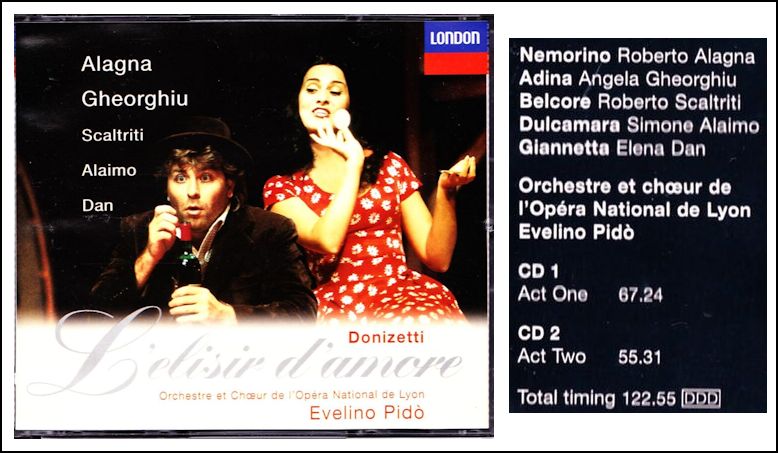
[This performance was also issued on video]
© 1995 Bruce Duffie
This conversation was recorded in Chicago on December 1, 1995.
Portions were broadcast on WNIB the following month, and again
in 1996 and 1997.
This transcription was made
in 2025, and posted on this website
at that time.
To see a full list (with links) of interviews which have been transcribed
and posted on this
website, click here.
To read my thoughts
on editing these interviews for print,
as well as a few other interesting observations,
click here.
* * * *
*
Award -
winning broadcaster
Bruce Duffie was with WNIB,
Classical 97 in
Chicago from 1975 until
its final moment as a classical
station in February of 2001.
His interviews have also appeared
in various magazines and journals since
1980, and he now continues his broadcast
series on WNUR-FM,
as well as on Contemporary
Classical Internet Radio.
You are invited
to visit his website for
more information
about his work, including selected
transcripts of other interviews,
plus a full
list of his guests.
He would also like to call your attention
to the photos and information about his grandfather,
who was a pioneer in
the automotive field more than a century
ago. You may
also send him E-Mail
with comments,
questions and suggestions.







